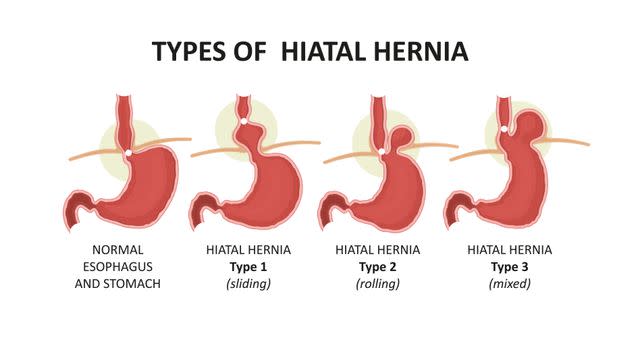What Is a Hiatal Hernia?

PeopleImages / Getty Images
Medically reviewed by Jay N. Yepuri, MD
A hiatal hernia occurs when part of the stomach protrudes through an opening in the diaphragm (called the hiatus) into the chest. While the cause isn't always clear, it can happen due to weakness of the diaphragm or surrounding muscles or increased pressure on the abdomen. With a hiatal hernia, the diaphragm cannot effectively help keep stomach acid from flowing into the esophagus, leading to heartburn, chest pain, and difficulty swallowing.
Treatment can help manage symptoms of this common condition, which affects up to 20% of people in the United States. Your risk of developing a hiatal hernia increases with age, and smoking or having obesity can also increase your risk.
Types
There are three types of hiatal hernia: sliding hiatal hernia, paraesophageal hernia, and mixed. They are classified depending on how the stomach protrudes through the diaphragm.
Sliding Hiatal Hernia
This is the most common type of hiatal hernia, accounting for about 95% of cases. In a sliding hernia, the area where the esophagus meets the stomach—known as the gastroesophageal junction—and a portion of the stomach slide up into the chest through an opening in the diaphragm. The movement is called "sliding" because the herniated portion can move in and out of the chest cavity.
Paraesophageal Hiatal Hernia
A paraesophageal hernia involves a portion of the stomach bulging through the diaphragm beside the esophagus, next to the gastroesophageal junction. It is also called a "rolling" hernia. Paraesophageal hernias are less common but can be more concerning because they carry a higher risk of complications, such as gastric volvulus (twisting) or strangulation of the herniated stomach tissue.
Sliding and rolling hernias can occur at the same time. This is known as a "mixed" hernia.

nmfotograf / Getty Images
Hiatal Hernia Symptoms
Many people with a hiatal hernia do not experience any symptoms, but others may have symptoms similar to those of gastroesophageal reflux disease (GERD). Common hiatal hernia symptoms include:
Chest pain or discomfort
Difficulty swallowing
Dry cough
Vomiting
Regurgitation of stomach acid or food into the throat or mouth (acid reflux)
What Causes Hiatal Hernia?
It is not always clear why a hiatal hernia develops, but certain factors can contribute to its development. A weakened or enlarged hiatus is one of the leading causes of a hiatal hernia. The hiatus is an opening in the diaphragm that the esophagus passes through to reach the stomach.
This can occur due to:
Age-related muscle weakening
Increased pressure on the abdomen (e.g., pregnancy, obesity)
Injury or trauma to the area
Repetitive lifting of heavy objects
Being born with an enlarged hiatus
Risk Factors
People of all ages can develop a hiatal hernia, but certain risk factors can increase your chances of developing one:
Being over the age of 50
Being pregnant
Having obesity
Persistent coughing or vomiting
Having a family history of hiatal hernia
Diagnosis
To diagnose a hiatal hernia, healthcare providers begin by gathering your medical history and performing a physical examination. They will ask about your symptoms and whether anyone in your family has a history of hiatal hernia.
Diagnostic tests help rule out other conditions, confirm the diagnosis, and determine the type and size of the hiatal hernia. Tests commonly used to diagnose a hiatal hernia include:
Upper endoscopy: A flexible tube with a camera is inserted through the mouth to examine the esophagus, stomach, and upper part of the small intestine. It helps visualize the stomach and esophagus to look for a hiatal hernia.
Barium swallow radiography: You will drink a liquid contrast material, which coats the esophagus and stomach before X-rays are taken to detect the presence and size of a hiatal hernia.
Esophageal manometry: This test measures the pressure and coordination of the esophagus muscles during swallowing. It helps evaluate the function of the esophagus and can detect any abnormalities that may contribute to a hiatal hernia.
pH testing: A small device is placed in the esophagus to measure the amount of acid reflux over a 24-hour period, which helps measure the amount of stomach acid that reaches the esophagus.
Computed tomography (CT) scan: CT scans produce detailed images of the chest and abdomen, allowing for a more detailed view of the esophagus and chest cavity. This test can also help detect complications from a hiatal hernia.
Treatments for Hiatal Hernia
Asymptomatic hiatal hernias often do not require treatment. If a hiatal hernia causes symptoms, treatment can help relieve symptoms and prevent complications.
Lifestyle Modifications
Dietary modifications and simple lifestyle adjustments may help manage or reduce symptoms. These may include:
Eat smaller, more frequent meals rather than large meals
Avoid foods and beverages that can trigger acid reflux (heartburn), such as tomatoes and tomato sauce, citrus fruits, spicy foods, carbonated drinks, and alcohol
Avoid eating three hours before bedtime
Wear loose-fitting clothing
Elevate your head during sleep
Maintain a healthy body weight
Medications
Medications that help control stomach acid and acid reflux can help relieve GERD-related hiatal hernia symptoms. These include:
Proton pump inhibitors (PPIs): These medications help reduce stomach acid production, alleviating symptoms of acid reflux and heartburn.
Antacids: Over-the-counter antacid medications can provide temporary relief by neutralizing stomach acid.
H2 receptor blockers: These medications reduce stomach acid production and can be used as an alternative to PPIs.
Surgery
Surgical procedures can treat severe hiatal hernias or when other treatments have not provided adequate relief. There are several surgical options, and which procedure is performed depends on several factors, including the severity and size of your hiatal hernia. Surgical procedures for treating hiatal hernia include:
Nissen fundoplication involves wrapping the upper portion of the stomach (fundus) around the lower esophagus to reinforce the lower esophageal sphincter and prevent the backward flow of stomach acid.
Repair surgery repositions the stomach back into the abdomen and closes the opening in the diaphragm to reduce herniation.
Collis-Nissen gastroplasty lengthens the esophagus by creating a new section using part of the stomach, followed by the Nissen fundoplication to address the acid reflux.
Prevention
It may not be possible to prevent the development of a hiatal hernia, but there are things you can do to help lower your risk or reduce symptoms.
Maintaining a healthy weight for you can help keep pressure off of your diaphragm. Similarly, eating smaller, more frequent meals can keep you from experiencing excess fullness after a meal, which can also put too much pressure on your abdomen.
Avoid common triggers, such as acidic foods like citrus fruits and juices, caffeine, alcohol, and spicy or fatty foods. Since smoking is also a trigger, avoiding smoking or quitting smoking can be helpful.
Complications
If left untreated, a hiatal hernia can lead to health problems, especially when the hiatal hernia causes GERD-like symptoms. Complications of a hiatal hernia include:
Esophagitis: Chronic acid reflux due to a hiatal hernia can cause inflammation of the esophagus, known as esophagitis, causing difficulty swallowing or bleeding, or ulcers in the esophageal lining.
Strangulation: In rare cases, the herniated portion of the stomach may become trapped or twisted (strangulation), which can impair blood flow to the herniated area and cause severe pain, tissue damage, and potentially life-threatening complications that require emergency surgery.
Barrett's esophagus: Prolonged exposure to stomach acid can change the lining of the esophagus and increase the risk of developing esophageal cancer.
Respiratory issues: If the herniated stomach puts pressure on the diaphragm, it can affect lung function and cause respiratory symptoms such as cough, wheezing, and shortness of breath.
Living With Hiatal Hernia
A hiatal hernia is generally manageable with appropriate treatment and lifestyle modifications. While living with a hiatal hernia may require adjusting your lifestyle, most people with a hiatal hernia benefit from making simple changes to their diet, avoiding heavy lifting, and wearing loose-fitting clothing to prevent acid reflux episodes and symptoms.
Frequently Asked Questions
What happens if a hiatal hernia is left untreated?
If a hiatal hernia is left untreated, it can lead to complications such as gastroesophageal reflux disease (GERD), esophagitis, Barrett's esophagus, and difficulty breathing. These complications can cause discomfort, pain, and difficulty swallowing.
In rare cases, a hiatal hernia can lead to strangulation of the herniated portion of the stomach, which cuts off blood flow and requires emergency surgery.
Can a hiatal hernia go away?
Hiatal hernias do not typically go away on their own. They are structural abnormalities in the anatomy of the diaphragm and stomach. Symptoms can be effectively managed through dietary changes, lifestyle adjustments, and medications.
Does drinking a lot of water help a hiatal hernia?
While drinking water is important for overall health and hydration, it does not directly treat or cure a hiatal hernia. Lifestyle modifications, such as eating smaller, more frequent meals, avoiding trigger foods, and prescribed medications, are more effective in managing hiatal hernia symptoms.
Can a hiatal hernia affect your heart?
Hiatal hernias primarily affect the digestive system and can cause acid reflux and GERD symptoms. If a paraesophageal hiatal hernia is large enough, it can irritate or compress the heart or surrounding structures, leading to an increased heart rate (tachycardia).
Sometimes symptoms of a hiatal hernia may mimic symptoms of a heart attack (e.g., chest pain). It's always best to err on the side of caution and seek medical attention for concerning symptoms.
For more Health news, make sure to sign up for our newsletter!
Read the original article on Health.

